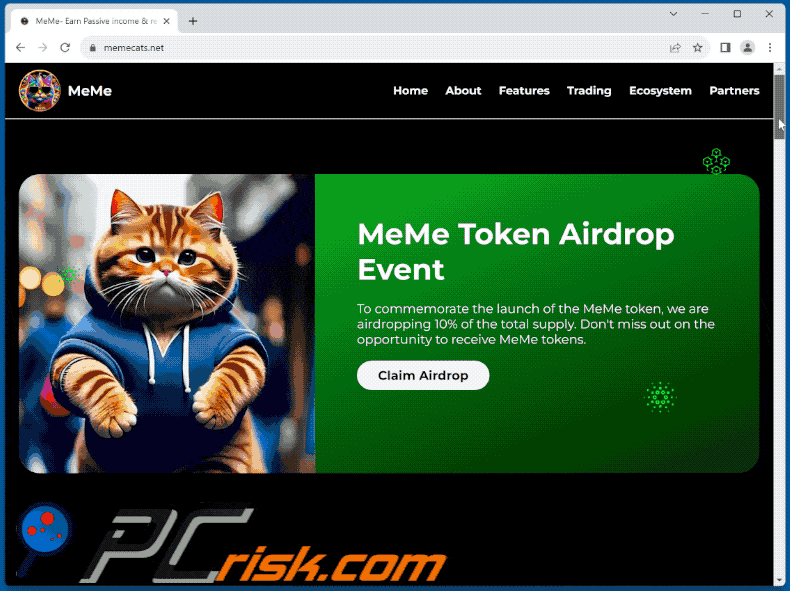How to identify fake airdrops like "MeMe Token Airdrop"
Phishing/ScamAlso Known As: Fake MeMe Token giveaway
Get free scan and check if your device is infected.
Remove it nowTo use full-featured product, you have to purchase a license for Combo Cleaner. Seven days free trial available. Combo Cleaner is owned and operated by RCS LT, the parent company of PCRisk.com.
What is "MeMe Token Airdrop"?
During our examination, we have determined that the MeMe Token Airdrop is a scam posing as a cryptocurrency giveaway. The perpetrators behind this deceptive scheme intend to defraud unsuspecting individuals by stealing their cryptocurrency. Consequently, it is advised not to trust this website.

"MeMe Token Airdrop" in detail
The "MeMe Token Airdrop Event" claims to celebrate the launch of the MeMe token by offering a giveaway of 10% of the total token supply. It invites users to claim their share of MeMe tokens by participating in the airdrop. However, the scammers behind this scam do not intend to deliver tokens.
Their goal is to trick users into believing that they have to connect their wallets to claim free tokens. However, the act of "connecting" a wallet triggers the signing of a malicious contract crafted to activate a cryptocurrency drainer. This drainer siphons funds from the victim's wallet to the scammer's wallet, effectively stealing cryptocurrency from unsuspecting users.
Users should exercise caution as reversing transactions of this nature is nearly impossible. Once funds are transferred from their wallet to the scammer's wallet, recovering the lost cryptocurrency becomes exceedingly challenging, if not entirely unfeasible.
Therefore, it is crucial for users to remain vigilant and avoid falling victim to such scams in order to protect their digital assets from irreversible loss.
| Name | Fake MeMe Token giveaway |
| Threat Type | Phishing, Scam, Social Engineering, Fraud |
| Fake Claim | Participants can receive free MeMe tokens |
| Disguise | Legitimate cryptocurrency giveaway |
| Related Domain | memecats[.]net |
| Detection Names | N/A (VirusTotal) |
| Symptoms | Lack of official verification, unrealistic claims, too good-to-be-true promises. |
| Distribution methods | Compromised social media accounts, hijacked WordPress sites, rogue online pop-up ads, phishing emails, unwanted applications. |
| Damage | Loss of sensitive private information, monetary loss, identity theft, possible malware infections. |
| Malware Removal (Windows) |
To eliminate possible malware infections, scan your computer with legitimate antivirus software. Our security researchers recommend using Combo Cleaner. Download Combo CleanerTo use full-featured product, you have to purchase a license for Combo Cleaner. 7 days free trial available. Combo Cleaner is owned and operated by RCS LT, the parent company of PCRisk.com. |
Conclusion
In conclusion, the MeMe Token Airdrop scam highlights the importance of vigilance and skepticism in the cryptocurrency space. Understanding the irreversible nature of transactions in the digital asset realm underscores the critical need for caution and discernment when navigating such opportunities.
By remaining vigilant and exercising due diligence, users can better protect themselves against falling victim to fraudulent schemes and safeguard their digital assets. Examples of similar scams are "Connect Collab Land", "CLAIM FREE $TOSHI", and "Telegram Giveaway TON".
How did I open a scam website?
It is common for shady advertising networks, prevalent on unauthorized streaming platforms and torrent websites, to serve as avenues for the promotion of scams. Thus, users who visit such pages often land on scam sites. Also, scammers often hijack social media accounts belonging to celebrities or businesses or hijack WordPress sites to promote fraudulent websites.
Furthermore, individuals may fall prey to scams via deceptive ads, pop-ups, buttons, etc., or similar on questionable websites (or notifications from such sites). Moreover, scammers resort to phishing emails to entice users into accessing counterfeit web pages. Occasionally, unreliable applications that are installed on devices lead users to scams.
How to avoid visiting scam pages?
Always double-check URLs before clicking links, ensuring they match official websites. Fraudsters often use similar-looking URLs to deceive. Be wary of ads, buttons, or pop-ups, especially on dubious sites. Avoid interacting with them to prevent redirection to scam pages. Treat emails cautiously, particularly those from unknown senders or containing unexpected links or attachments.
Obtain apps exclusively from trusted sources such as official websites or reputable app stores. Remove any suspicious apps already installed on your devices. If your computer is already infected with unwanted apps, we recommend running a scan with Combo Cleaner Antivirus for Windows to automatically eliminate them.
The appearance of "MeMe Token Airdrop" (GIF):

Instant automatic malware removal:
Manual threat removal might be a lengthy and complicated process that requires advanced IT skills. Combo Cleaner is a professional automatic malware removal tool that is recommended to get rid of malware. Download it by clicking the button below:
DOWNLOAD Combo CleanerBy downloading any software listed on this website you agree to our Privacy Policy and Terms of Use. To use full-featured product, you have to purchase a license for Combo Cleaner. 7 days free trial available. Combo Cleaner is owned and operated by RCS LT, the parent company of PCRisk.com.
Quick menu:
- What is Fake MeMe Token giveaway?
- How to identify a pop-up scam?
- How do pop-up scams work?
- How to remove fake pop-ups?
- How to prevent fake pop-ups?
- What to do if you fell for a pop-up scam?
How to identify a pop-up scam?
Pop-up windows with various fake messages are a common type of lures cybercriminals use. They collect sensitive personal data, trick Internet users into calling fake tech support numbers, subscribe to useless online services, invest in shady cryptocurrency schemes, etc.
While in the majority of cases these pop-ups don't infect users' devices with malware, they can cause direct monetary loss or could result in identity theft.
Cybercriminals strive to create their rogue pop-up windows to look trustworthy, however, scams typically have the following characteristics:
- Spelling mistakes and non-professional images - Closely inspect the information displayed in a pop-up. Spelling mistakes and unprofessional images could be a sign of a scam.
- Sense of urgency - Countdown timer with a couple of minutes on it, asking you to enter your personal information or subscribe to some online service.
- Statements that you won something - If you haven't participated in a lottery, online competition, etc., and you see a pop-up window stating that you won.
- Computer or mobile device scan - A pop-up window that scans your device and informs of detected issues - is undoubtedly a scam; webpages cannot perform such actions.
- Exclusivity - Pop-up windows stating that only you are given secret access to a financial scheme that can quickly make you rich.
Example of a pop-up scam:

How do pop-up scams work?
Cybercriminals and deceptive marketers usually use various advertising networks, search engine poisoning techniques, and shady websites to generate traffic to their pop-ups. Users land on their online lures after clicking on fake download buttons, using a torrent website, or simply clicking on an Internet search engine result.
Based on users' location and device information, they are presented with a scam pop-up. Lures presented in such pop-ups range from get-rich-quick schemes to fake virus scans.
How to remove fake pop-ups?
In most cases, pop-up scams do not infect users' devices with malware. If you encountered a scam pop-up, simply closing it should be enough. In some cases scam, pop-ups may be hard to close; in such cases - close your Internet browser and restart it.
In extremely rare cases, you might need to reset your Internet browser. For this, use our instructions explaining how to reset Internet browser settings.
How to prevent fake pop-ups?
To prevent seeing pop-up scams, you should visit only reputable websites. Torrent, Crack, free online movie streaming, YouTube video download, and other websites of similar reputation commonly redirect Internet users to pop-up scams.
To minimize the risk of encountering pop-up scams, you should keep your Internet browsers up-to-date and use reputable anti-malware application. For this purpose, we recommend Combo Cleaner Antivirus for Windows.
What to do if you fell for a pop-up scam?
This depends on the type of scam that you fell for. Most commonly, pop-up scams try to trick users into sending money, giving away personal information, or giving access to one's device.
- If you sent money to scammers: You should contact your financial institution and explain that you were scammed. If informed promptly, there's a chance to get your money back.
- If you gave away your personal information: You should change your passwords and enable two-factor authentication in all online services that you use. Visit Federal Trade Commission to report identity theft and get personalized recovery steps.
- If you let scammers connect to your device: You should scan your computer with reputable anti-malware (we recommend Combo Cleaner Antivirus for Windows) - cyber criminals could have planted trojans, keyloggers, and other malware, don't use your computer until removing possible threats.
- Help other Internet users: report Internet scams to Federal Trade Commission.
Frequently Asked Questions (FAQ)
What is a crypto scam?
A crypto scam refers to any fraudulent activity within the cryptocurrency space. The goal is typically to trick individuals into sending cryptocurrency, activating a cryptocurrency drainer, or providing sensitive information, leading to financial losses, identity theft, or other issues.
Is it possible to retrieve lost crypto funds?
Once cryptocurrency transactions are executed, they are mostly irreversible, rendering it extremely difficult, if not impossible, to retrieve funds once they have been transferred to a scammer's wallet.
Why do I encounter crypto scams?
Scammers utilize a range of techniques to spread their scams. These tactics encompass phishing emails, compromised social media accounts, seized websites like WordPress sites, deceptive ads, pop-ups on dubious sites, and the utilization of unauthorized advertising networks.
Will Combo Cleaner protect me from scams?
Combo Cleaner offers website analysis to identify potential scams. Upon detecting fraudulent behavior, users receive immediate notifications, and access restrictions are promptly implemented.
Share:

Tomas Meskauskas
Expert security researcher, professional malware analyst
I am passionate about computer security and technology. I have an experience of over 10 years working in various companies related to computer technical issue solving and Internet security. I have been working as an author and editor for pcrisk.com since 2010. Follow me on Twitter and LinkedIn to stay informed about the latest online security threats.
PCrisk security portal is brought by a company RCS LT.
Joined forces of security researchers help educate computer users about the latest online security threats. More information about the company RCS LT.
Our malware removal guides are free. However, if you want to support us you can send us a donation.
DonatePCrisk security portal is brought by a company RCS LT.
Joined forces of security researchers help educate computer users about the latest online security threats. More information about the company RCS LT.
Our malware removal guides are free. However, if you want to support us you can send us a donation.
Donate
▼ Show Discussion